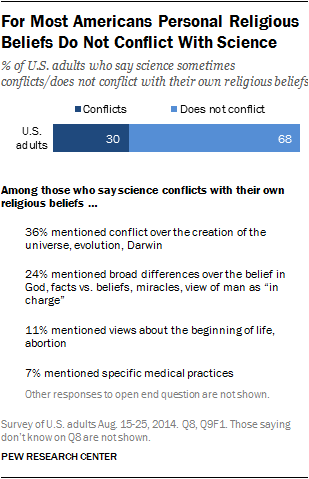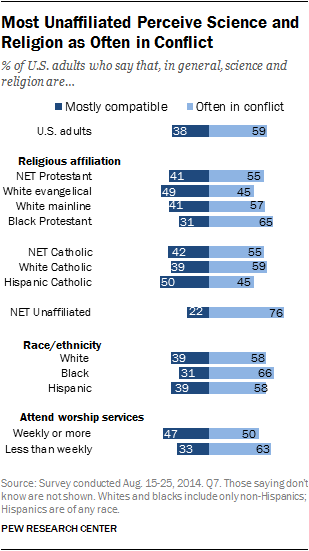How much do people’s religious beliefs influence their views about science topics? There was debate for centuries about the origins of the universe and how to explain stellar and planetary activities in the heavens. In more recent decades, there has been debate among religious leaders over the theory of evolution through natural selection since the initial publication of Charles Darwin’s “On the Origin of the Species” in 1859.1 Stemming from what some see as a contradiction between the theory of evolution and core tenets of the Christian faith, the debate over evolution and its place in the school curriculum has played out in local communities and the courts around the country, including the Supreme Court in State of Tennessee v. Scopes, popularly referred to as the Scopes “monkey” trial of 1925.
And, these disputes persist with at least two current science-related books addressing the divide between those who think science and religion are fundamentally at odds and those who argue that science and religion can be compatible.2

The new Pew Research Center findings show that most Americans (59%) say, in general, that science often is in conflict with religion, although a sizeable minority of adults (38%) consider science and religion to be mostly compatible. Those most inclined to see religion and science as generally in conflict are those who, themselves, have no particular religious affiliation or are not religiously observant.
At the same time, however, most adults (68%) say there is no conflict between their personal religious beliefs and science.
Among the three-in-ten adults who say their own religious beliefs conflict with science, the most common area of conflict centers around teachings about the creation of the universe and evolution.
Perceptions of Science and Religion Overall

Some 59% of Americans say science and religion are often in conflict, while 38% say the two are mostly compatible. The share saying that science and religion often conflict is up modestly from 55% in a 2009 Pew Research survey, while the share saying the two are mostly compatible has stayed the same at 38%.
Those who are not affiliated with a religious tradition are especially likely to think that science and religion conflict (76%). Most black Protestants (65%) also hold this view.
White evangelical Protestants and Hispanic Catholics are more divided on this question. Half of Hispanic Catholics (50%) say science and religion are mostly compatible, while 45% say the two are often in conflict. And 49% of white evangelical Protestants say science and religion are mostly compatible; a similar share (45%) says the two are often in conflict.
Personal Religious Beliefs and Science

When thinking about their own religious beliefs, however, only a minority of adults perceive a conflict between science and their religious views. Three-in-ten (30%) Americans say their own religious beliefs conflict with science, while 68% say the two do not conflict. Compared with 2009, fewer Americans see a conflict between science and their personal religious beliefs in the new survey. Among those with a religious affiliation, 34% say their religious beliefs conflict with science, down from 41% in 2009. The perception of conflict is down among most major religious groups, including white evangelical Protestants (from 52% saying their own beliefs conflict with science in 2009 to 40% in 2014). Perceptions of conflict among black Protestants have stayed about the same, however.

In the new Pew Research Center survey, white evangelical Protestants are a bit more likely to see a conflict between their religious beliefs and science; four-in-ten (40%) say the two conflict, while 57% say they do not conflict. Among Catholics and black Protestants, 36% say their religious beliefs sometimes conflict with science.
White mainline Protestants are less likely to say their religious beliefs conflict with science; 21% of this group says there is a conflict while 78% say there is not.
Among the religiously unaffiliated, 16% say their own religious beliefs sometimes conflict with science while fully 81% say they do not.
There are a variety of ways that science conflicts with personal religious beliefs

In an open-ended question, adults who said that science conflicts with their own religious beliefs were asked to provide up to three beliefs of theirs with which science was in conflict. The most common reported response relates to views on the creation of the universe, including evolution (36%). Among those responding, 24% referenced broad differences such as that their belief in God is at odds with a perspective that man is “in charge” or that the miracles in the Bible were at odds with science. Other ways science is perceived as conflicting with religious beliefs include views about the beginning of life and abortion (11%) and scientific or medical practices such as blood transfusion, cloning or genetic engineering (7%). Some 18% of those who say their own religious beliefs sometimes conflict with science did not name any particular ways in which the two conflict.
The same open-ended question was asked in 2009, and American adults reported similar types of conflicts. The most common response in 2009 also centered on conflict around beliefs about the creation of the universe and evolution (41%). Mentions of conflict over the beginning of life including abortion and stem cell research appear to be less common today than in 2009 (11% in 2014 down from 23% in 2009). There were comparatively more responses referencing broad conflicts between science and religion such as the belief in God and the Bible in the 2014 survey (24%) than there were in 2009 (11%).
There is a close division in public attitudes about the role of the church in science policy issues
The general public is closely divided on whether churches and other houses of worship should express their views about policy decisions on scientific issues; half of adults say churches should express their views on these issues, while 46% say these organizations should keep out of policy decisions on scientific issues.

White evangelicals (69%) and black Protestants (66%) are more likely than other religious groups to think churches and other places of worship should express their views about scientific policy issues.
Catholics are closely divided in opinion about this, with 45% saying churches should express their views and 49% saying they should keep out.
While about two-thirds (66%) of religiously unaffiliated adults say churches should keep out of policy decisions on scientific issues, 31% say otherwise.
Overall, most of those who attend religious services regularly (64%) say religious organizations should express their views on scientific policy decisions. By comparison, 44% of adults who attend worship services less than once a week say churches should express their views on policy decisions about science and 53% of this group says churches should keep out.
The pattern of findings on this question is broadly in keeping with public views on the role of religious organizations in social and political matters. In a separate 2014 Pew Research survey, 49% of adults said churches and other houses of worship should express their views on day-to-day social and political issues while a nearly equal share at 48% said churches should keep out of political matters. Most of those who have no religious affiliation said churches and other houses of worship should keep out of politics (65%), while a minority of 32% said churches should speak out on political matters. By contrast, a majority of those who identify with a religion (e.g., Protestants, Catholics and others) said that churches should express their views on political matters; the share having this point of view increased from 45% in 2010 to 54% in 2014.




